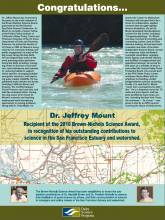 Dr. Jeffrey Mount - 2016 Brown-Nichols Science Award winner
Dr. Jeffrey Mount - 2016 Brown-Nichols Science Award winner
Dr. Jeffrey Mount was honored by his peers as the sixth recipient of the Brown-Nichols Science Award, presented at the 9th Biennial Bay-Delta Science Conference.
Dr. Mount is currently a Senior Fellow at the Public Policy Institute of California’s Water Policy Center and Professor Emeritus of the UC Davis Department of Earth and Planetary Sciences. He joined the faculty of UC Davis in 1980.
Dr. Mount is recognized for his scholarly writings and public engagement on many of the big issues facing the Bay-Delta. With his students and colleagues at UC Davis, PPIC and other institutions, he has helped frame some of the more pressing policy questions facing the Delta. These include managing levees in the face of sea level rise, land subsidence and seismicity, restoring habitat to support native species, managing multiple ecosystem stressors, and improving water supply reliability. He has published many articles and books, including the acclaimed California Rivers and Streams: The Conflict between Fluvial Process and Land Use, and held two endowed chairs.
During his long career at UC Davis his research and teaching emphasized multi-disciplinary approaches to solving problems. With his friend and colleague Dr. Peter Moyle, he started the Center for Watershed Sciences with the goal that it be a home for collaborative, applied research that brought together diverse disciplines. Currently led by Dr. Jay Lund, the Center has become an integral part of the Bay-Delta science infrastructure. He and Dr. Moyle also taught interdisciplinary courses together, including “Ecogeomorphology”, which studied white-water rivers throughout the West, Canada and Alaska. Their collaboration on this class was honored when they co-held the UC President’s Chair in Undergraduate Education.
Dr. Mount has been involved in providing and overseeing science used in Delta decision-making. He has been both a member and chair of the Delta Independent Science Board, served on numerous state and federal oversight committees, regularly briefs agency and elected officials, and testifies at congressional and legislative hearings. He served for five years as a member of what is now called the Central Valley Flood Protection Board. His current work at the PPIC Water Policy Center, led by Dr. Ellen Hanak, continues these efforts with an emphasis on building a better bridge between science and policy.
Finally, it is said that Dr. Mount “never met a microphone he didn’t like.” He is a frequent source for TV, radio and print reports, and has been profiled by many news outlets, including the New York Times. His nickname - “Dr. Doom” - was given to him by an NPR reporter covering the future of Delta levees.
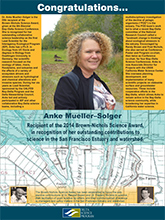 Dr. Anke Mueller-Solger - 2014 Brown-Nichols Science Award winner
Dr. Anke Mueller-Solger - 2014 Brown-Nichols Science Award winner
Dr. Anke Mueller-Solger is the fifth recipient of the Brown-Nichols Science Award, presented at the 8th Biennial Bay-Delta Science Conference. She is recognized for her outstanding collaborative science leadership as the first Lead Scientist for the Interagency Ecological Program (IEP), a role she served for six years under the sponsorship of the CALFED Bay-Delta Program and the Delta Stewardship Council. The IEP is a consortium of six Federal and three State agencies that has conducted cooperative ecological investigations in the San Francisco Estuary since 1970. The mission of the IEP is to provide and integrate relevant and timely ecological information for management of the Bay-Delta ecosystem and the water that flows through it. Anke led and actively participated in IEP and other collaborative Bay-Delta science teams on a wide range of topics, including a multidisciplinary investigation of the decline of pelagic organisms (“POD”) in the estuary. The POD team’s work led to what a recent Bay-Delta committee of the National Research Council called a “landmark change in thinking” about ecological stressors in the estuary. Anke also helped organize four Bay-Delta Science Conferences. Encouraged by Randy Brown and Fred Nichols, she served as Conference Poster and Program co-chair and then twice as Conference co-chair. Anke has a Ph.D. in Ecology from UC Davis and degrees in Biology from Goettingen University in Germany. Her scientific research has focused on the ecology of lakes, rivers, floodplains and estuaries and the effects of a variety of ecosystem drivers and stressors such as hydrological and chemical alterations and invasive species. Anke recently became the Associate Director for Projects with the U.S. Geological Survey’s California Water Science Center where she leads and oversees planning, development, and implementation of a large variety of scientific projects about the State’s surface and groundwater resources. These projects span the entire State, but also include cooperative projects in the Bay-Delta which will allow Anke to remain an active member of the Bay-Delta science community while continuing to broaden her expertise in California water science.
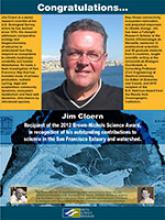 Dr. Jim Cloern - 2012 Brown-Nichols Science Award Co-winner
Dr. Jim Cloern - 2012 Brown-Nichols Science Award Co-winner
Jim Cloern is a Senior Research Scientist at the U.S. Geological Survey where he has worked since 1976. His research addresses comparative ecology and biogeochemistry of estuaries to understand how they respond as ecosystems to climatic-hydrologic variability and human disturbance. He leads a team investigation of San Francisco Bay that has included study of primary production, nutrient cycling, algal and zooplankton community dynamics, ecosystem metabolism and food web dynamics, disturbance by introduced species, Bay-Ocean connectivity, ecosystem restoration, and projected responses to climate change. Jim has been a Fulbright Research Scholar at the Centre d'Océanologie de Marseille, mentored 12 postdoctoral scientists and 20 graduate students from 6 countries, taught scientific writing at the Université de Bretagne Occidentale, is Consulting Professor (Civil Engineering) at Stanford University, Co-Editor of Estuaries and Coasts, and 2010 recipient of the B.H. Ketchum Award from the Woods Hole Oceanographic Institution.
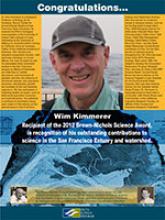 Dr. Wim Kimmerer - 2012 Brown-Nichols Science Award Co-winner
Dr. Wim Kimmerer - 2012 Brown-Nichols Science Award Co-winner
Dr. Wim Kimmerer is a Research Professor of Biology at the Romberg Tiburon Center for Environmental Studies of San Francisco State University. He is an honorary Fellow of the California Academy of Sciences who studies how estuarine ecosystems function, with particular emphasis on human effects. For over 25 years he and his associates have conducted studies in the San Francisco estuary on effects of freshwater and tidal flow on habitat, abundance, and movement of plankton and fish; the influence of introduced species; and population dynamics, reproduction, growth, and mortality of fish and foodweb organisms. He has participated in modeling studies on topics, such as delta smelt population dynamics and hydrodynamics. He has served on numerous review or advisory boards, such as for the Bay Delta Conservation Plan, 2008 Biological Opinion for delta smelt, Klamath River dam removal project, Delta Vision Task Force, Delta Risk Management Strategy, Delta Native Fishes Recovery Team, and the State Water Resources Control Board workshops on flow. He is especially proud to have been a co-founder, with Randy Brown and Fred Nichols, of the California Estuarine Research Society, an affiliate of the Coastal and Estuarine Research Federation.
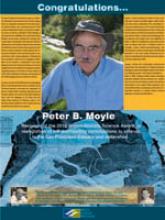 Dr. Peter Moyle - 2010 Brown-Nichols Science Award Winner
Dr. Peter Moyle - 2010 Brown-Nichols Science Award Winner
Dr. Peter B. Moyle was honored by his peers as the second recipient of the Brown-Nichols Science Award, presented at the 6th Biennial Bay-Delta Science Conference. He received this award in recognition of his outstanding contributions to science in the San Francisco Estuary and watershed.
Moyle is the foremost expert on California freshwater and estuarine fish and has always been an outspoken advocate for the preservation of California fishes. He is associate director of the Center for Watershed Science at the University of California, Davis, as well as a professor of fish biology in the Department of Wildlife, Fish, and Conservation Biology. He has been studying the ecology and conservation of freshwater and estuarine fishes in California for more than 40 years and has documented the declining status of many native species in California, as well as invasions of alien species.
Moyle was a member of the National Research Council panel on endangered fishes in the Klamath River and is a member of the Technical Advisory Committee for restoring the San Joaquin River. He, along with his colleagues at UC Davis and the Public Policy Institute of California, is part of the Delta Solutions Team, which is addressing diverse problems in the estuary.
Moyle is also author, co-author, or co-editor of more than 180 peer-reviewed scientific papers, eight books, and many other publications. The revised version of his book Inland Fishes of California was published in 2002, and the 5th edition of Fishes: Introductory to Ichthyology—a widely used ichthyology text co-authored with Joseph Cech—was published in 2004. In 2008 he completed an assessment of the state of salmon and trout in California, which is available on-line (http://www.caltrout.org). His newest book, published in 2010 Protecting Life on Earth: An Introduction to the Science of Conservation, with Michael Marchetti as lead author.
In 2007 Moyle received the Outstanding Achievement Award from the Association of Fisheries Research Biologists, and the Award of Excellence from the American Fisheries Society. During his career Professor Moyle has mentored more than 40 students who completed either Master's theses or doctoral dissertations. These graduates now hold professorships at prestigious universities or responsible positions at pivotal natural resource agencies or private consulting firms.
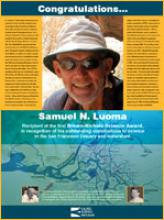 Dr. Sam Luoma - 2008 Brown-Nichols Science Award Winner
Dr. Sam Luoma - 2008 Brown-Nichols Science Award Winner
Dr. Samuel N. Luoma was honored by his peers as the first recipient of the Brown-Nichols Science Award, presented at the 5th Biennial CALFED Science Conference (now called the Bay-Delta Science Conference). He received this award in recognition of his outstanding contributions to science in the San Francisco Estuary and watershed.
Luoma was recognized for his contributions to California as the first Lead Scientist of the CALFED Bay-Delta Program, a role he served in for three years beginning in 2000. Additionally, he was hailed for his work in unraveling some difficult contamination issues in the Delta, particularly those related to mercury and selenium, shedding light on their important implications for policy makers.
Luoma retired from the U.S. Geological Survey after 34 years as a research scientist. Luoma currently leads science policy coordination for the John Muir Institute of the Environment at the University of California, Davis, and is editor-in-chief of the on-line journal San Francisco Estuary and Watershed Science. He is also a scientific associate with the National History Museum in London, UK. His specific research interests are in the bioavailability and effects of metals in aquatic environments, as well as coordination of water policy with science. Luoma has served as a scientific advisor on many issues at the interface of science and environmental management, including in areas of environmental monitoring design, science for water management, sediment quality criteria and bioavailability of contaminants in soils and sediments.
He is the author of more than 200 peer-reviewed publications, many of which dealt with water quality issues in the San Francisco Bay/Sacramento-San Joaquin Delta. With Dr. Philip Rainbow, Dr. Luoma co-authored, Metal Contamination in Aquatic Environments: Science and Lateral Management in 2008. Dr. Luoma is a Fellow in the American Association for the Advancement of Science, was a W. J. Fulbright Distinguished Scholar in the UK in 2004, and received the rank of Meritorious Senior Government Employee from the U.S. President in 2006.
